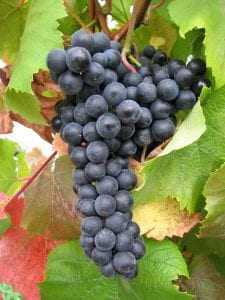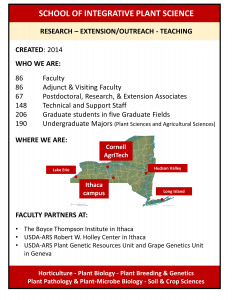
School of Integrative Plant Science
Plant Pathology and Plant-Microbe Biology Section
Cornell University College of Agriculture and Life Sciences
AgriTech – NYS Agricultural Experiment Station
Geneva, NY 14456
Position: Assistant Professor; Grape Disease Ecology and Epidemiology; tenure track, academic year appointment (9-month)
Effort Distribution: 60% research, 40% extension
Start Date: July 1, 2019 or as negotiated
Please apply online at: https://academicjobsonline.org/ajo/jobs/10263
Named Appointment: The successful candidate will hold the distinguished title of Susan Eckert Lynch Faculty Fellow for the first 5 years of his or her term. At Cornell University, appointments at the rank of assistant professor are made initially for 3 years.

Responsibilities: The position has responsibility for generating and disseminating knowledge concerning the biology, ecology and management of grapevine diseases. Although the primary programmatic focus should be on fungal diseases important to the commercial grape industry of New York and surrounding regions, additional cooperative work on relevant diseases caused by viruses, bacteria or other agents is appropriate. The successful applicant will develop a nationally and internationally recognized research program whose output will increase our basic understanding of various factors impacting the development of grapevine diseases and the tools used for their control, thereby improving management programs. Appropriate disciplinary specialties of the successful applicant include but are not limited to infection biology, population genetics, genome biology, host-pathogen interactions, epidemiology, disease modeling, integrated pest management and sustainability. An ability to work as part of an interdisciplinary team that includes other plant pathologists, viticulturists, plant breeders, entomologists, economists and enologists is required. For the extension function, the successful applicant will assume leadership of Cornell’s outreach program in grape pathology, maintaining its integration within the larger, interdisciplinary extension program in viticulture and enology. A dedication to providing practical, science-based information on disease diagnosis and sustainable management programs is essential, as is an ability to work with a diverse range of colleagues and stakeholders, including growers, extension educators, private-sector advisors, agrichemical and other industry support personnel, government regulators and the general public. Excellent oral and written communication skills are required for preparation and delivery of pertinent information to stakeholders. It is expected the incumbent will utilize several appropriate media delivery technologies.
Qualifications: A Ph.D. in plant pathology, microbiology, mycology, genetics, ecology or a closely related discipline. Experience in research, as demonstrated by publication in peer-reviewed journals, is required and prior experience in extension or stakeholder engagement is preferred. Ability to communicate effectively with students, colleagues and external stakeholders is critical.
Salary and Benefits: Competitive, commensurate with background and experience. An attractive fringe benefits package is available. Support for start-up research costs will be available.
Cornell University seeks to meet the needs of dual career couples, has a Dual Career program, and is a member of the Upstate New York Higher Education Recruitment Consortium to assist with dual career searches. Visit http://www.unyherc.org to see positions available in higher education in the upstate New York area.
Application procedure: A letter of application, curriculum vitae, statement of research goals and plans, reprints of selected papers, transcripts, and the names of three references may be submitted via academic jobs online at https://academicjobsonline.org/ajo/jobs/10263. Questions related to the position may be directed to Dr. Tom Burr, search committee chair at tjb1@cornell.edu.
Cornell University is committed to hiring and promoting a diverse faculty.
Review of applications will begin October 15, 2018 and will continue until the position is filled.
About Cornell:
The College of Agriculture and Life Sciences is a pioneer of purpose-driven science and Cornell University’s second largest college. We work across disciplines to tackle the challenges of our time through world-renowned research, education and outreach. The questions we probe and the answers we seek focus on three overlapping concerns: natural and human systems; food, energy and environmental resources; and social, physical and economic well-being.
Cornell University is an innovative Ivy League university and a great place to work. Our inclusive community of scholars, students and staff impart an uncommon sense of larger purpose and contribute creative ideas to further the university’s mission of teaching, discovery and engagement. With our main campus located in Ithaca, NY, Cornell’s far-flung global presence includes the medical college’s campuses on the Upper East Side of Manhattan and Doha, Qatar, as well as the new Cornell Tech campus opening on Roosevelt Island in the heart of New York City.
We offer a rich array of services, programs and benefits to help employees advance in their career and enhance the quality of personal life, including employee wellness, workshops, childcare and adoption assistance, parental leave and flexible work options.
Diversity and inclusion have been and continue to be a part of our heritage. Cornell University is a recognized EEO/AA employer and educator.
About the School of Integrative Plant Science:
SIPS was launched by the College of Agriculture and Life Sciences in June 2014 to provide a unifying framework for five Sections (formerly Departments) with interrelated activities in the plant sciences at Cornell: Horticulture, Plant Biology, Plant Breeding & Genetics, Plant Pathology & Plant-Microbe Biology, and Soil & Crop Sciences. The Sections are associated with distinct disciplines, graduate fields, and knowledge bases, but are increasingly connected by urgent challenges and revolutionary tools relevant to all plant scientists. Read more at: https://sips.cals.cornell.edu/

